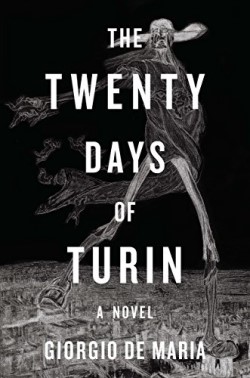
oddly prescient 1970s cosmic horror novel that vibes with the insanity of the modern internet complete with social alienation, paranoia, and the rise of fascism
- Italian novel published in 1975
- translated into English by Ramon Glazov in 2016
- 224 pages
- creepy, weird, political violence, cosmic horror, bleak as all hell
(Last updated on December 31, 2022. Added some links below.)
Mysterious freaky murders took place ten years ago in Turin, and an Italian salary man decides to play amateur investigator. He fucks around and finds out. Glazov, the translator, accurately sums up the type of horror this story invokes.
Nobody wins in De Maria’s nightmare, where the Cosmos itself has become terroristic. It’s open to doubt if even the Cosmos can reach its goals. The only safe choice available is not to pry too deeply. To paraphrase the novel’s most fearsome mortal character: Why insist on searching where human reason could find only shadows?
I read this without knowing anything about Italian history, but apparently it was written in the middle of the Years of Lead. During that time, civilians were killed by extremist political forces and oftentimes people didn’t know why. Twenty Days of Turin is unique in how it manages to capture the vibe, the paranoia, and the political nature of the massacres without making it limited to a specific time.
The technology level is very analogue but otherwise it avoids references to key dates, so it adds to a sense of eerie timelessness, like it could happen again. An eruption of organized mass murders could take place in our communities and we’d just be forced to stay quiet and pretend everything is fine.
The plot is less important than the impeccable vibe and the strangely modern ways people’s social lives are fucked up. The Library is a real trip. It’s a place that was organized by a creepy group of uniformed, attractive youths supposedly to encourage the people of Turin to connect with each other. And how do you do that? By putting private diary entries in the Library. People paid to put in entries and paid extra to find out the real identity of the author.
And what do people do with that? Gross old dudes write porny shit and try to get the attention of underaged girls, people stalk each other, and people who submitted entries to the Library end up being paranoid as hell about who read their work. You end up with a city of insomniacs who shuffle around at night, and can’t remember the murders that took place in front of their eyes. The protagonist interviews the sister of one of the victims, who had been experiencing insomnia and nightmares before his grisly death:
He wanted room! He said that within him there was no room left, no more space to move, to turn around. He said something horrible as well: ‘Even if I wanted to kill myself, I wouldn’t find the space to die!’
The unnamed protagonist also begins a correspondence with an anonymous dude, and god the letter back is an unhinged description of his apartment.
What leaves me baffled is that the Administration has begun to use the stairwell shaft as a garbage dump. At first I didn’t take much notice: it was old furniture, books, papers, kitchen scraps. But later, the nature of the waste started to become—how to put this?—somewhat more challenging and personal. One would find—if you’ll permit me the term—human excrement, which fell from above in ever increasing amounts.
The other reviews on sites like Amazon have way too many spoilers, but the actual plot is less important than the nightmare implications firmly embedded in the subtext. It’s a bizarre, uniquely unforgettable work.I read this book nearly six months ago and I’m still looking for people to unpack it with. It’s the nightmare that keeps on giving.
Links
There’s a great podcast interview with the translator on Rite Gud’s Patreon, locked behind the Book Club membership tier, posted on November 25, 2022. You can listen to it before reading the book.
The Novel as a Torino Scale: Twenty Days of Turin and the Secret History of Italy by Christopher Sloce is an incredible 30-minute read on the political context the novel was written in, as well was where De Maria got his creepily prescient ideas regarding social media.
A writer best educated in his tradition with a piercing understanding of mass communication is a strong one, but De Maria understood that the flip side of mass communication was a paralyzed silence. What good is all the mass communication if there’s no communication?
De Maria's other ideas sound like they're straight out of Black Mirror. The Novel as a Torino Scale spoils some of the plot so I recommend giving this a read once you've done with the book and need a debriefer to understand exactly how your world is wrecked.
To say things didn’t go according to plan ignores something very crucial about the Library: nobody knew what the plan was really. The effect, however, was a sense of near possession once its patrons began writing: “The prospect of “being read” quivered in the distance like an enchanting mirage–a mirage as real, nonetheless, as the realities that were written down. I will give myself to you, you will give yourself to me: on these very human foundations, the future exchange would happen.” But the Library finds itself a lure to “people with no desire at all for “regular human communication”.